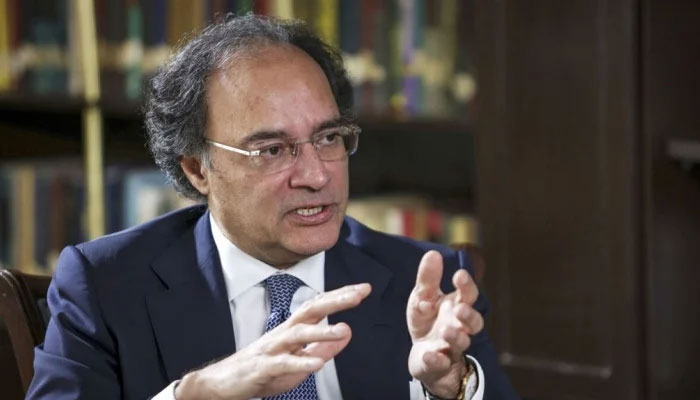‘Charter of business’: finance minister’s vision for economy
Six months before he was named finance minister in the new government, Aurangzeb was in the US capital
WASHINGTON: The new Finance Minister, Muhammad Aurangzeb, has a vision to fix and take forward the country’s economy which he calls the “charter of business”.
Some six months before he was named finance minister in the new government, Aurangzeb was in the US capital, leading a delegation of Pakistan’s top business leaders from diverse sectors. The delegation met American policy makers as well as officials of various financial institutions.
Talking to The News after concluding his two-day visit, he shared his vision on how the country’s economic structure could be turned around. “Our view is very clear that the private sector now has to step up,” he explained. “We request political parties to bring on a minimum consensus on how to take forward the economy,” he said, emphasizing that the visiting delegation discussed “charter of business” which “means how to change our business models so we could slowly reduce import-led subsidies and focus on exports”.
He underlined that besides bringing in foreign investment, the authorities had to build confidence of the local investor as well. “We have a lot of time, place, confidence and are being followed through rigorously to bring investments into Pakistan,” he said.
As a leader of the visiting delegation, Aurangzeb said the business leadership was getting mixed signals from international financial institutions. Hence, during their two-day trip, the delegation met DFC, IFC and US Treasury officials. “We wanted to hear them out,” he said, “they told us that they were open for business in Pakistan. It was encouraging for us that an open dialogue for the private sector was engaging with policy makers.”
“We have, from the private sector perspective, appreciated their support for the 9-month SBA, because of which we got the breathing room,” he said about the IMF’s lending program for Pakistan last year. “We have insisted that as we go forward, we need an extended and larger programme from the Fund,” he said, adding that “from a private sector perspective, our view is that we need that for the duration of 3 to 5 years so we could do policy reforms, restructuring and that would be based on the IMF umbrella.”
He said the delegation extended requests to the US Treasury that they continue supporting Pakistan’s steps towards economic reforms. “Their response was very positive and they said they would support the government, they encouraged us that we should initiate a reform agenda as well.” He insisted that the private sector was supportive of the reform agenda thus it was an aligned agenda and “we will ourselves try to change and reform our business models as well”.
Explaining the possible reforms, he said the country needed to privatize and fix SOE losses, the circular debt had to be addressed, and that the tax to GDP ratio could not depend on salaried classes or organised sector only. “We have to bring in retail, real estate and agriculture sector into the fold.”
-
 It's A Boy! Luke Combs, Wife Nicole Welcome Third Child
It's A Boy! Luke Combs, Wife Nicole Welcome Third Child -
 Leading Astrophysicist Shot Dead At Southern California Home
Leading Astrophysicist Shot Dead At Southern California Home -
 Johnny Depp's Kind Gesture Towards Late 'Grey's Anatomy' Actor Eric Dane Before Death Laid Bare
Johnny Depp's Kind Gesture Towards Late 'Grey's Anatomy' Actor Eric Dane Before Death Laid Bare -
 How Princess Eugenie, Beatrice React To Andrew Arrest?
How Princess Eugenie, Beatrice React To Andrew Arrest? -
 Kylie Jenner 'convinced' Gwyneth Paltrow Is 'crushing' On Timothee Chalamet: 'It's Disrespectful'
Kylie Jenner 'convinced' Gwyneth Paltrow Is 'crushing' On Timothee Chalamet: 'It's Disrespectful' -
 Jemma Chan Reflects On 'difficult Subject Matter' Portrayed In 'Josephine'
Jemma Chan Reflects On 'difficult Subject Matter' Portrayed In 'Josephine' -
 Blood Falls In Antarctica? What Causes The Mysterious Red Waterfall Hidden In Ice
Blood Falls In Antarctica? What Causes The Mysterious Red Waterfall Hidden In Ice -
 AI Power Play: Nvidia Moves To Invest $30 Billion In OpenAI
AI Power Play: Nvidia Moves To Invest $30 Billion In OpenAI -
 Will Savannah Guthrie Ever Return To 'Today' Show? Here's What Insiders Predict
Will Savannah Guthrie Ever Return To 'Today' Show? Here's What Insiders Predict -
 Andrew Mountbatten-Windsor In A Fix Over New Disturbing TMZ Photos
Andrew Mountbatten-Windsor In A Fix Over New Disturbing TMZ Photos -
 Eric Dane Opened Up About Releasing His Memoir Just Two Months Before His Death Due To ALS Complications
Eric Dane Opened Up About Releasing His Memoir Just Two Months Before His Death Due To ALS Complications -
 Zendaya, Tom Holland Already Married? Actress Shows Off New Ring
Zendaya, Tom Holland Already Married? Actress Shows Off New Ring -
 King Charles Holds Emergency Meeting After Andrew Arrest: 'Abdication Is Not Happening'
King Charles Holds Emergency Meeting After Andrew Arrest: 'Abdication Is Not Happening' -
 Amazon Can Be Sued Over Sodium Nitrite Suicide Cases, US Court Rules
Amazon Can Be Sued Over Sodium Nitrite Suicide Cases, US Court Rules -
 'Vikings' Star Mourns Eric Dane's Death
'Vikings' Star Mourns Eric Dane's Death -
 Patrick Dempsey Reveals Eric Dane's Condition In Final Days Before Death
Patrick Dempsey Reveals Eric Dane's Condition In Final Days Before Death




